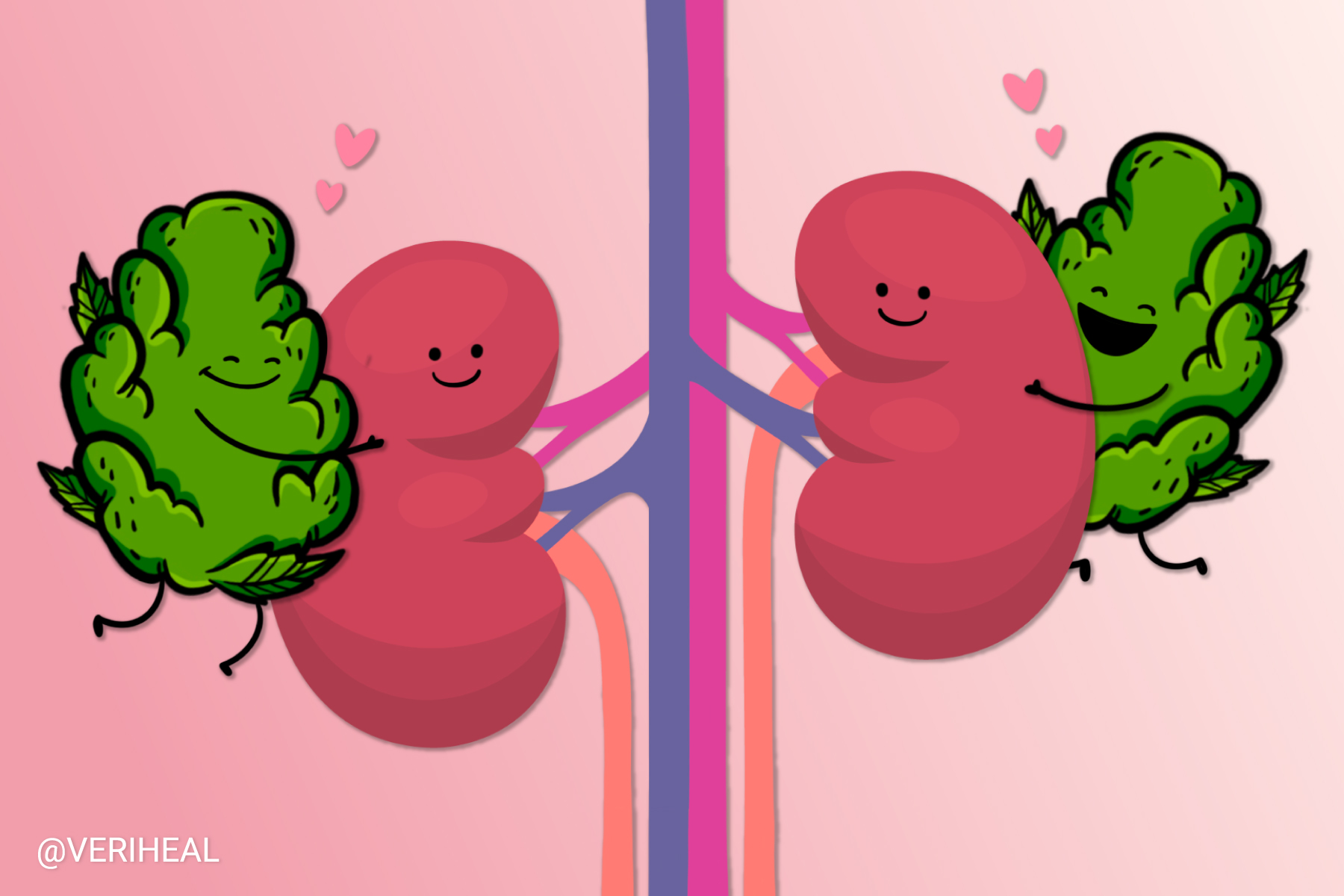Kidney problems and conditions can be quite debilitating and they are often inadequately treated. As cannabis gains legality and social acceptance, more individuals are turning to it, whether for its therapeutic properties or for recreational use. When considering that kidney impairments are in need of adequate treatments and that cannabis is a medical marvel, one wonders whether cannabis has anything to offer the kidneys and its impairments.
What are Kidneys and Their Functions?
The kidneys are two bean-shaped organs in the renal system, which are primarily responsible for assisting the body with getting rid of waste through urine. However, that is not all that these organs are responsible for. Although performing multiple vital functions the most important would be the fact that the waste and excess fluid is expelled from the body through urine. The “critical regulation of the body’s salt, potassium and acid content is performed by the kidneys”. Additional vital functions include filtering blood before it goes back to the heart, removing waste products from the body including drugs, balances bodily fluids, releases hormones that regulate blood pressure, produces an active vitamin D to promote strong and healthy bones, and controls the production of red blood cells.
The kidneys are about the size of a fist and can be found on either side of the spine, near the lowest level of the rib cage. The National Kidney Foundation explains that “Each kidney contains up to a million functioning units called nephrons. A nephron consists of a filtering unit of tiny blood vessels called a glomerulus attached to a tubule. When blood enters the glomerulus, it is filtered and the remaining fluid then passes along the tubule. In the tubule, chemicals and water are either added to or removed from this filtered fluid according to the body’s needs, the final product being the urine we excrete”.
Kidney-Related Diseases
Conditions often associated with the renal system are either common kidney diseases or chronic kidney disease. Chronic kidney disease (CKD) is “a progressive loss in kidney function over a period of months to years” which may result in the need for dialysis or a transplant. Examples include:
- Acute kidney injury
- Kidney failure
- Kidney cysts
- Kidney stones
- Nephrotic syndrome
- Urinary tract infection
- Uremia
- Azotemia (damaged/injured kidneys)
- Nephrotic syndrome (kidney releases too much protein)
Symptoms Indicative of a Renal Problem
Since there are quite a variety of conditions associated with kidneys, it can be expected that each has its’ own set of symptoms which may include one, or many, of the following:
- Difficulty sleeping
- Fatigue
- Difficulty concentrating
- Dry or/and itchy skin
- Increased/decreased urination
- Blood in urine
- Foamy urine
- Puffy eyes
- Swelling of foot or ankle
- Suppressed/reduced appetite
- Muscle cramps
Why You Should Get Your Medical Marijuana Card
Veriheal has satisfied millions of patients nationwide by giving them access to these benefits
- Larger purchase limits
- Peace of mind
- Enhanced legal protection
- Access to higher potency strains
- Save up to 25% on cannabis purchases
- Skip the line at the dispensary
Supporting Research Suggests That Cannabis Can Help
An Alternative to Harmful Pharmaceuticals
Pharmaceutical medication can be taxing on- and harmful to- your kidneys and may even negatively impact the ability to perform their vital functions. Consuming cannabis as the medication might help reduce or even eliminate the risks of harm or damage. The National Kidney Foundation has ongoing information about the kinds of pharmaceuticals that have a significant and adverse impact such as antibiotics, diuretics, non-steroidal anti-inflammatory drugs- NSAIDs, proton pump inhibitors- PPIs, certain supplements including wormwood oil, and laxatives. A study published in 2017 “found little evidence that marijuana use affects kidney function in healthy young adults”. And another study explained that the kidneys will be impacted by cannabis since they are one of the organ systems “where CB1 and CB2 receptors are expressed”. Those two receptors are the two receptors which the cannabinoids (CBD, THC, etc) interact within the body. The same study suggests that, unlike pharmaceuticals, cannabis can promote renal homeostasis through its interaction with the endocannabinoid system. In other words, cannabis can promote harmony in the renal system. Additionally, another study “provides some reassuring evidence suggesting that there is no detrimental effect” on kidneys according to Dr. Murray Mittleman, a professor of epidemiology at Harvard University’s School of Public Health.
Therapeutic Properties of Cannabis
A study published in the Canadian Journal of Kidney Health and Disease in 2019 administered non-synthetic cannabinoids to real patients with kidney impairments. The study found that those patients were significantly more likely to report improvement in pain compared to those who received a placebo. Unfortunately, the study concluded that more research needs to be conducted due to the limitations of the small sample size and not enough time. An even more recent study published in March 2020, found that cannabis was especially effective for alleviating pain and reducing the need for opioids in patients with chronic kidney disease (CKD) and with end-stage renal disease (which would require dialysis or a transplant).
Dr. Joshua Rein, a nephrologist at Mt. Sinai Hospital in New York, offered up some additional insight on the benefits of cannabis on kidneys and stated that,
“Among people living with kidney disease, it’s estimated that about one quarter to one-half of patients experiences chronic symptoms such as pain, nausea, anorexia, sleep disturbance, anxiety, and depression. Several of these are approved indications for medical cannabis across the United States in various states. Additionally, anxiety, depression, and insomnia are the most common psychiatric conditions that people self-treat with cannabis”.
The doctor goes on to explain that while there may not be specific research available on cannabis for kidney symptoms such as those mentioned above and including inflammation, there is ample research available on the efficacy of cannabis for alleviating those symptoms. Dr. Rein also commented on the fact that cannabis use can reduce the need for opioids by stating that “over 60% of dialysis patients have received at least one opioid prescription annually, and approximately 20% of dialysis patients take prescription opioids chronically. But we know that the short term and chronic use of opiates are associated with increased morbidity and mortality among people with kidney disease”.
Individuals with kidney impairments should only consume the lowest effective cannabis dose and that cannabis intake should not be done through smoking. It is also important to note that cannabis found in one’s system may impact listing and eligibility as a transplant candidate-which means that it is important to consult a physician before consuming cannabis.
Author, Share & Comments









